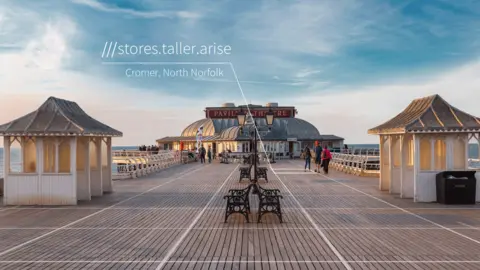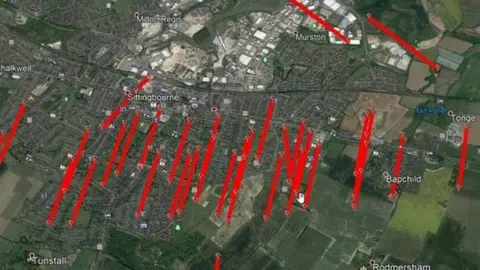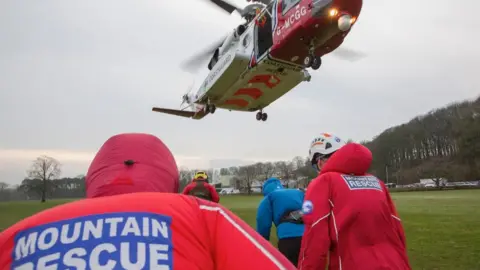App used by emergency services under scrutiny
 What3words
What3wordsQuestions have been raised about a digital addressing system which divides the world up into three-by- three-metre squares to pinpoint someone's location.
What3Words (W3W) gives each square a unique three-word address, and the app is used by 100 UK emergency services.
But a security consultant found thousands of locations with similar words less than 1km (0.6 miles) apart.
W3W acknowledged there were similarly labelled squares in close proximity, but said examples were rare.
The issue appears to be how the system's algorithm sorts where to put which three words, and in particular where it places words that are spelt differently but pronounced the same (homophones), similar sounding words, and plurals.
"I realised that there are a very significant number of words easily confused. The more words that can be confused, the higher the chance that a mistake is made and the wrong location given," researcher Andrew Tierney, who works for Pen Test Partners, told the BBC.
"When I dug deeper, I discovered that large numbers of plurals and homophones are actually very close to each other. In time-critical situations such as a life-threatening accident, emergency services personnel going to the wrong location - say one to three kilometres away from the actual location - could be the difference between life and death."
So, for example, circle.goal.leader and circle.goal.leaders are less than 2km apart along the River Thames.
And just over 50km apart in Sheffield and Leeds are stream.rivers.abode and steam.rivers.abode.
 Andrew Tierney
Andrew TierneyMr Tierney told the BBC there were "thousands" of others "less than one kilometre apart".
"In an effort to use simple, short words in areas of high population density - a logical and good idea- it seems to have caused close repetitions and use of plurals in physically close locations," he explained, providing a detailed explanation of what he found on Twitter.
Chris Sheldrick, co-founder of W3W told the BBC: "The design of our system specifically shuffles word combinations around the world as one of several intentional design features that we balance (another being to place more complex words in the sea).
"Whilst the overwhelming proportion of similar sounding three-word combinations will be so far apart that an error is obvious, there will still be cases where similar sounding word combinations are nearby."
He added that anyone conducting a "systemic search using of our software" would come across examples, but they represented a "one in 2.5 million" occurrence, out of the 242 billion three-word addresses in the UK.
In a blog on the issue, W3W acknowledged that it was right it was receiving "public scrutiny" because of its use by emergency services.
It added that a feature called Autosuggest "actively intercepts possible errors or confusions and highlights other possibilities to the user, helping to identify what might need to be checked."
Wrong address
 Getty Images
Getty ImagesA recent report from UK-based Keswick Mountain Rescue suggests errors have occurred, although it was not clear what caused them.
The report details how a couple, waiting with an injured walker, provided a W3W grid reference to emergency services, but the rescue team were initially sent "many miles" away from where they were waiting.
"For some unknown reason the W3W reference positioned the casualty close to the A66 near Braithwaite," reads the report.
"Fortunately PhoneFind technology was used and a grid reference confirmed the location as on a path between Green Gable and Base Brown - many miles from the A66", it said.
A spokesperson for W3W said that other addressing systems, such as grid references or GPS co-ordinates, could also create "communication errors".
"We launched the system with full understanding that whilst we had made trade-offs in our shuffling algorithm, it provided a huge communication benefit over the commonly-used location system alternatives. We have good feedback from our partners and users supporting this view."
In response to the Keswick example, W3W said that there were a number of factors that could have caused the error, including a mistake reading out the words, typing them in, or in onward communication.
W3W has enjoyed a stellar rise and much publicity since it was set up by Chris Sheldrick in 2013.
As well as working with emergency services, it has announced a range of partnerships with car-makers while firms such as Ikea and Hermes have signed up to use it for deliveries.
